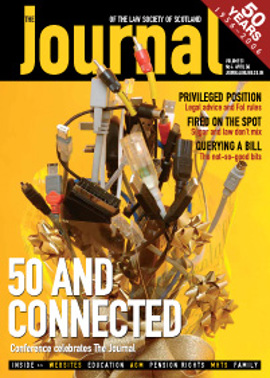Legal science or law-lite? A response

In his recent article, Professor Gretton suggests that the influx of non-Scots to teach in the Scottish law schools is damaging Scots law and the relation of the universities with the local profession. Scots law, he argues, is in danger of losing its intellectual and professional roots.
While I welcome the opportunity this provides to debate the future of legal education in Scotland, the argument has been presented by Professor Gretton in a way which, in my view, misunderstands the impact of globalisation and its impact on Scots law. By focusing only on changes in legal education without also considering changes in legal practice, he has inevitably presented a distorted picture.
First of all, it is clear that, as Professor Gretton suggests, the relationship between law schools and their local communities is changing as a consequence of globalisation. However, this is not a one-way process of opening up places in our universities to outsiders – and it can hardly matter who teaches Scots law provided that it is done well – but reflects more fundamental changes in the nature of contemporary legal practice.
Lawyers in Scotland regularly deal with their counterparts in other EU jurisdictions or from further afield. Scottish law graduates pursue their legal careers in places such as London, Brussels, Geneva, New York – as well as in the local profession. And through exchange programmes, the law schools open their doors to significant numbers of foreign students. Does this mean, as Professor Gretton suggests, that the universities are being de-coupled from the communities in which they were once embedded? Perhaps so, but it is also the case that the legal community for which our undergraduates are being prepared is itself changing. It is now much broader and more international and this must be reflected in the content of the LLB.
Is Scots law at risk as a consequence? It is not quite clear what Professor Gretton means when he talks about Scots law. His ideal appears to have been the point in the 18th century when the symbiosis between legal education and practice, and between Roman law and an emergent national legal system led to the production of the institutions of Scots law. However, these institutions were largely about private law – property, contract and delict – which comprised the bulk of Scots law at the time they were written.
The picture at the beginning of the 21st century is very different. With the Scottish Parliament and the Human Rights Act, Scots public law is a large and growing area. Fields of law, such as intellectual property or environmental law, have emerged that would have been unthinkable to the institutional writers. These are central to legal practice and are popular amongst students. They may draw on existing principles of Scots law, but cannot be reduced to them, as they often now include substantial elements of European or international law. They may not be Scottish in the sense that would have been understood by the institutional writers, but they are the law which applies within our jurisdiction, and which is taught in our law schools.
Even so, it may be going too far to say that the Scots private law is at risk. It is a smaller part of the whole, and it should not be surprising that it occupies a proportionately lesser place in the curriculum. It is, notwithstanding this, of fundamental importance to the development of an understanding of law, and continues to occupy a foundational place in the LLB.
It should also be noted that research into Scots law is more active and vital than at any time in the last 200 years, partly in consequence of the Research Assessment Exercise. It has led to the production of a new generation of professional academics who have a proper training in research skills and in the academic disciplines that enhance their understanding of law.
The problem in the end is not that of choosing between legal science and law-lite. It is instead to recognise that the current changes in legal education owe less to the alleged inadequacies of law teachers than to the processes of globalisation and the opening up of new areas of legal practice. We cannot reverse these processes, and to seek to insulate ourselves against them by reversion to a traditional conception of legal science would run the risk of making the law less, not more, relevant. The important question for both practitioners and legal academics today is that of how we can respond to these challenges.
An extended version of this article can be read at www.journalonline.co.uk/submissions
In this issue
- Bias and mental health tribunals: a reply
- Legal science or law-lite? A response (1)
- Opening a binding global route for personal data
- Mentally disordered offenders
- Change but not for the sake of it
- Legal science or law-lite? A response
- On message
- A bill to query
- Client confidentiality and freedom of information
- Rushed law and wrongful death
- Qualifying by degrees
- Safeguards before the MHTs
- The treatment of pension rights on divorce
- We've paid for it: what do you mean it's not ours?
- Communication: the #1 risk management tool?
- Sugar but not sweet
- AGM report
- Guidance on guidelines
- The licensed trade: going up in smoke?
- Clause for concern
- Fully charged
- Scottish Solicitors' Discipline Tribunal
- Website reviews
- Book reviews
- New CAR drives discharge regime






